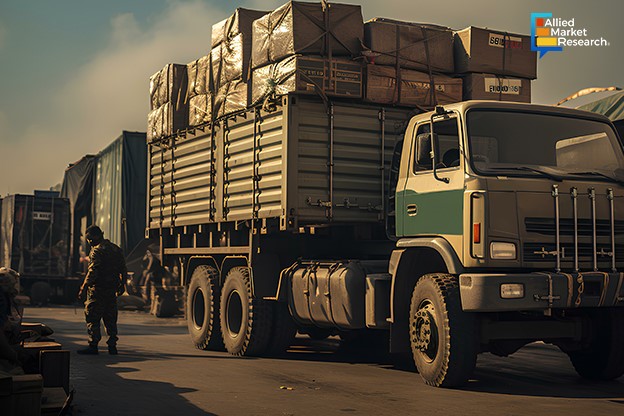How does Defense Logistics Play a Key Role in Promoting Smooth Military Operations?

21 Mar
2024
Highlights
- Important commodities in defense logistics
- Skills required for smooth defense logistics operations
- Key alliances made by leading players in the sector
Defense logistics plays a vital role in ensuring national security. It involves a series of activities that include procurement, transportation, storage, distribution, and maintenance of a wide range military goods such as equipment & ammunition, and other essential materials such as food, medicines, spare parts of vehicles, and fuel. These logistic operations allow military units to access necessary commodities at the right time and place, enabling them to accomplish ongoing missions more effectively.
Essential commodities in defense logistics
In several military operations, the stock of ammunition at the required site is highly essential. Several logistics chains deliver a wide range of ammunition including missiles, shells, bullets, and explosives to support military operations. Some infantry units require small arms & ammunition, and some military bases require precision-guided ammunition for doing airstrikes. Moreover, there are different logistics chains that cater to specific military requirements. Owing to high demand of ammunitions for various military operations, the armament segment of the industry is expected to hold a major share of the industry, garnering a revenue of $126.1 billion from 2023 to 2032.
On the contrary, fuel holds a vital role in carrying out modern military operations. Starting from tanks to aircraft, various military vehicles need fuel to perform required actions. Armed forces mainly rely on fuel to conduct air patrols, maritime missions, and ground maneuvers. For this, several defense logistics work to deliver on time delivery of fuel to operating bases and military units, irrespective of challenging environments.
Furthermore, in the life-threatening environment of defense, the availability of medical care is highly essential. Specific types of defense logistics for the procurement and distribution of medical supplies are there. To enable military professionals to get timely access to medical resources, several logistics chains operate efficiently. This further helps in treating casualties and saving many valuable lives.
What are the key skills for effective defense logistics?
As defense logistics is a complex operation, it requires adequate information to respond properly in the challenging field of military and defense. To carry out logistics operation smoothly, military personnel need to do predictive planning to avoid potential threat from enemies or other harsh conditions and deliver commodities smoothly to the required bases. Therefore, strategic thinking is highly essential for the supply chain personnels to successfully navigate problems and apply proven methods to move goods safely. Furthermore, information analysis and technological literacy are some essential skills that the individuals in this field should know. Such skills make individuals aware of the impacts of taking different routes and find safe directions for transporting commodities, promoting logistics processes efficiently.
Profitable moves by top players that businesses in this domain should look into
The defense logistics industry has experienced significant growth due to increase in government investments in various military modernization programs. Several leading players in this domain have adopted strategies such as mergers, acquisitions, partnerships, and collaborations to stay ahead in the competitive landscape. In March 2021, Crowley, a supply chain logistics services company, was awarded with a multi-year contract of $192.4 million by the U.S. Defense Department to deliver fuel management and storage services for Pacific military operations. These services include storage, protection, and shipment of aviation grade JP-5 turbine fuel and commercial grade Jet A-1 fuel.
In September 2021, Vertex Aerospace, a leading designer & provider of thermal control systems, announced its acquisition of Raytheon Technologies, an American multinational aerospace and defense conglomerate. With this acquisition, the companies aim to develop a more integrated and comprehensive suite of solutions for fostering defense logistics operations. By strengthening such logistics operations, the companies envision the smooth delivery of both domestic and international equipment to the military units.
To conclude, the increase in need for effective and resilient supply chain for smooth military operations is expected to fuel the growth of the industry in the future. Furthermore, the rise in military conflicts and geopolitical tensions are the prime reasons that are anticipated to boost the need for efficient defense logistics in the years to come.
To identify potential investment opportunities in the defense logistics industry, feel free to talk to our industry experts today! They help develop new business strategies and initiatives.

Rosy Behera
Author's Bio- Rosy Behera holds a bachelor’s degree in Electrical and Electronics Engineering and now she is a content writer by profession. She loves to portray her thoughts and ideas with a nice command of words. Grabbing an audience with her creative write-ups is one of her biggest assets so far. Apart from writing, she is a certified “Odisi” dancer and has done Gardharva in Drawing, Painting, and Arts. She always explores new things through travel and is a big foodie.
Avenue: Entire Library membership of Allied Market Research Reports at your disposal
- Avenue is an innovative subscription-based online report database.
- Avail an online access to the entire library of syndicated reports on more than 2,000 niche industries and company profiles on more than 12,000 firms across 11 domains.
- A cost-effective model tailored for entrepreneurs, investors, and students & researchers at universities.
- Request customizations, suggest new reports, and avail analyst support as per your requirements.
- Get an access to the library of reports at any time from any device and anywhere.
Related Post
-
How are Submarine Cables Transforming Global Connectivity with Enhanced User Experience?
-
Endoscopy Procedures: Transformations in Techniques and Applications
-
AI-Powered Video Analytics: How the Product Actually Works for enterprises
-
Painting Robots: Transforming Precision Coating and Creative Applications
-
Innovations in Pharmacovigilance Systems Advancing Patient Safety
-
Understanding Edge Security: Keeping Data Safe Near the Source
-
Exploring the Use and Advancements of 3D Laser Scanners in Professional Applications
-
Reinforcing Industrial Controls with Smarter Tools and Training








